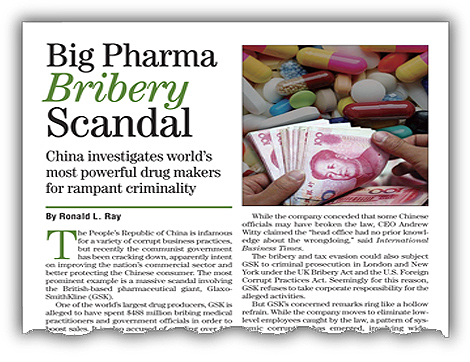
• China investigates world’s most powerful drug makers for rampant criminality.
By Ronald L. Ray —
The People’s Republic of China is infamous for a variety of corrupt business practices, but recently the communist government has been cracking down, apparently intent on improving the nation’s commercial sector and better protecting the Chinese consumer. The most prominent example is a massive scandal involving the British-based pharmaceutical giant, GlaxoSmithKline plc (GSK).
One of the world’s largest drug producers, GSK is alleged to have spent $488 million bribing medical practitioners and government officials, in order to boost sales. It is also accused of evading over $16 million dollars in taxes and artificially inflating drug prices.
And while the Chinese attempt to clean house, Western “pro-business” commentators have sought to deflect blame from the perpetrators, even by writing editorials threatening pullout of foreign businesses from the world’s largest economy.
Forty-six suspects have been investigated by Chinese authorities for actions involving the entire GSK China operation, from key executives like its former head, Mark Reilly, down to field salesmen providing the bribes and “favors” to doctors in exchange for a significant increase in sales of GSK drugs.
The $1 trillion global drug market is highly competitive, leading too often to unscrupulous business practices.
China is also investigating pharmaceutical giants Novartis International AG, AstraZeneca plc, Sanofi S.A., Bayer AG and Eli Lilly and Company.
According to a May 14 article in the South China Morning Post, the illegal activity ostensibly began in January 2009 under Reilly’s direction. In 2012, Reilly, GSK vice-president Zhang Guowei and legal affairs supervisor Zhao Hongyan purportedly established an “emergency group” to block police investigations by bribing officials in Beijing, Shanghai and elsewhere. These men are among those accused of crimes, which could lead to life in prison.
“We take the allegations that have been raised very seriously. They are deeply concerning to us and contrary to the values of GSK,” a GSK-issued statement said.
While the company conceded that some Chinese officials may have broken the law, CEO Andrew Witty claimed “the head office had no prior knowledge about the wrongdoing,” reported International Business Times.
The bribery and tax evasion could also subject GSK to criminal prosecution in London and New York under the UK Bribery Act and the United States Foreign Corrupt Practices Act. Seemingly for this reason, GSK refuses to take corporate responsibility for the alleged activities.
But GSK’s concerned remarks ring like a hollow refrain. While the company moves to eliminate low-level employees caught by the law, a pattern of systemic corruption has emerged, involving widespread, serious bribery charges in Lebanon, Jordan, Iraq and Poland.
In 2012, GSK paid $3 billion in fines and settlements to the U.S. government, admitting to bribery of physicians, fraudulent drug safety claims and illegally promoting pharmaceuticals for unapproved uses. It was the largest healthcare fraud settlement in American history.
Witty claimed at that time, also, to have “learnt from the mistakes that were made.” Apparently not. Altogether, this suggests a longstanding policy of corruption originating at the top of the corporation. But, as noted previously, these are rampant, industry-wide practices.
Transparency International (TI) reports on corruption in over 100 countries, ranked according to popular perceptions. According to TI, the U.S. and UK are considered to be in the top 20 for honesty in business and government, with strong laws against corporate corruption. Yet, time and again, it is Western firms, from Goldman Sachs to GSK, which most widely perpetrate crimes on the citizenry—often with government collusion. Ironically, it is communist China, with little liberty and few ethics or quality controls, which seems to be developing a nationalistic conscience for protecting its people against plutocratic predators.
The Wall Street Journal, among others, wants us to believe that this bribery scandal does not originate with “big business” or “big pharma,” but with the corrupt Chinese, who magically caused poor GSK to act criminally. Sounds like the hallucinatory WSJ is “doing drugs.”
Ronald L. Ray is a freelance author and an assistant editor of THE BARNES REVIEW. He is a descendant of several patriots of the American War for Independence.


1 Comment on Big Pharma Bribery Scandal